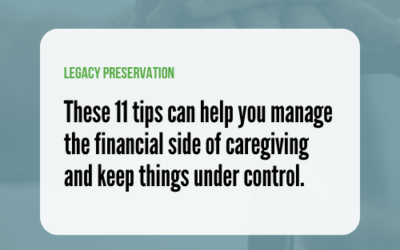Estate Planning
Handling Key Non-Tax Financial Issues When a Loved One Passes Away (Part 3)
A financially comfortable loved one has passed away.
During this time of seemingly endless bad news, that’s not an uncommon situation. Sad but true.
The now-deceased loved one may have been single or married and may have been a relative or not. In any case, you’ve stepped up to the plate and taken on the challenging job of acting as executor for the deceased person’s estate. Good for you.
But it can be a lot of work.
This article is the third and final installment of our series on what you as the executor need to know about both the most important federal tax issues and the most important non-tax financial issues. For the two earlier articles on tax matters, see:
- Tax Considerations When a Loved One Passes Away (Part 1)
- Tax Considerations When a Loved One Passes Away (Part 2)
The Executor’s Role
When a loved one passes away, someone must handle the resulting financial fallout.
That person may be identified in the decedent’s (the deceased loved one’s) will as the executor of the decedent’s estate. If there is no will, the probate court will appoint an administrator. In either case, it’s often the surviving spouse or another family member who takes on the responsibility.
In this article we will refer to that person as the executor. That would be you!
Your role as the executor is to identify the estate’s assets, pay off its debts, and distribute the remainder to the rightful heirs and beneficiaries.
You are also responsible for filing any necessary tax returns and arranging to pay any taxes. We covered the most important tax issues in the first two installments of our series. This third and final article presents the rest of the
story. Here goes.
Key Point. As the executor, you may feel morally obligated to do “much more” than just handle the basic financial- related tasks. This article also addresses what “much more” might include.
Wait! Should You Hire a Professional Executor Instead?
Perhaps. If the decedent was wealthy with complicated financial affairs, hiring a professional executor might be a good idea for that reason alone. It takes some of the heat off you.
Another situation where a professional executor might be advisable is warring or just-plain-unreasonable heirs. This is not unusual in families of means.
For example, a financially distressed heir may be demanding his or her share in cash “right now” even though that’s obviously impossible under the circumstances. A professional executor can quash such nonsense without you having to get involved.
This Is a Project Management Situation
Whether you hire a professional executor or not, you may feel morally obligated to handle many things beyond just the financial matters.
In the financially comfortable—decedent scenario, the financial aspects of winding up the estate can involve lots of time-consuming work. The dollar stakes can be high, and there may be inconvenient deadlines.
Then there are all the other tasks that you may feel obligated to take on. This can result in an overwhelming amount of work, often under time pressure. So you must stay focused, set priorities, and stick to them.
In other words, you must put yourself into the project management mode. Some folks are better at project management than others. Even if you are pretty good at it, most tasks that you perform will probably take far more time than you expect. Nature of the beast. Be ready for that.
Must the Estate Go through Probate?
Hopefully not. Many well-off individuals and married couples put their most valuable assets into a revocable trust (aka family trust, living trust, or grantor trust). Reason: to avoid probate. If the decedent failed to take that step, probate is in the cards. Ugh!
Probate is a legal process that includes proving in court that the decedent’s will (if one exists) is valid, identifying the decedent’s assets and having them appraised, paying the estate’s debts and taxes, and finally distributing the remaining assets as specified by the will. If there’s no will, assets must be distributed according to applicable state law.
Probate can involve paperwork and court appearances by attorneys. It can be expensive. The estate pays the attorney fees and related court costs. Going though probate can also delay the winding up of the estate for a long time. Heirs may be unhappy to hear this, but it is what it is.
Thankfully, some assets can be passed to the rightful heirs and beneficiaries without going through probate. Examples include real property owned as joint tenants with right of survivorship (JTWROS), life insurance death benefits if the decedent designated policy beneficiaries, and retirement accounts if the decedent designated beneficiaries for the accounts.
Getting Extra Death Certificates
For various reasons, a death certificate may be needed to prove that the decedent has passed away. You may need originals (not copies) for some purposes.
Advice. Get at least five originals from the applicable source. Get more if the decedent had lots going on—such as real estate owned in several jurisdictions. If in doubt, get more originals than you think will be needed. In fact, get a lot more.
Updating a Married Couple’s Revocable Trust Probably
If the decedent was married, a revocable trust (aka family trust, living trust, or grantor trust) may have been set up to hold the couple’s most important assets and thereby avoid probate for those assets.
Both spouses are usually named as co-trustees. If so, the trust may have to be amended to eliminate the decedent as a co-trustee and add a new co-trustee (usually an adult child) to help the surviving spouse manage the trust’s assets.
You may be the new co-trustee. Welcome aboard!
The trust’s beneficiary and distribution provisions must be reviewed to see if they reflect current reality. If the trust was set up many years ago, changes are probably necessary.
- Designated trust beneficiaries may have passed away.
- Some living beneficiaries may have greatly disappointed the surviving spouse who now wants to impose consequences.
- There may be grandchildren who have never been added to the list of beneficiaries.
- There may be adult beneficiaries who have proven to be financially irresponsible and whose shares must therefore be made subject to restrictions to protect them from themselves.
Advice. Consult a good estate planning attorney to make needed trust changes. Do it quickly, because nobody knows how much longer the surviving spouse will be around to get this job done.
If the surviving spouse passes away before the desired changes are made, the trust—with all its uncorrected faults —becomes irrevocable and set in stone. That would not be good!
Selling a High-End Home
If the decedent was widowed at the time of death, the heirs will probably want to sell the place. In most areas, there are distinct home-selling seasons.
The real estate agent will encourage you to get the place ready for sale during that season so it can be sold for top dollar. You may be presented with a ready-for-sale deadline that’s much sooner than you would prefer—more time pressure.
If the decedent was married, the surviving spouse may want to downsize, move closer to relatives, or move to a low-tax state.
If the surviving spouse is elderly, he or she may want to move into an assisted living environment. You may feel morally obligated to arrange for the surviving spouse’s move on top of arranging to sell the former marital abode. If there’s a lot to be moved, hiring a professional organizer and packer to help get the job done can be a really good
idea. Money well spent!
If the high-end home that must be sold now is large and was lived in for many years, there may be tons and tons of “stuff’ packed into the place. Some of it might be valuable.
Advice. If there’s lots of valuable stuff that heirs are not interested in possessing (such as a houseful of fine furniture, expensive rugs, and nice antiques), consider hiring an estate liquidator to turn the unwanted stuff into cash. Heirs like cash!
Changing the Title to the Home
You may have to change the title to the home before it can be sold.
For example, this can be the case if the home was owned by a revocable trust to avoid probate. If the decedent was single, the trust is now an irrevocable trust, because the person who set it up has died.
If so, title to the home may have to be changed to reflect that fact.
If the home was owned by a revocable trust set up by a married couple, the trust may have to be amended to remove the decedent as a co-trustee. Title to the home may have to be changed to reflect that fact. There are other situations that may require changing title to the home.
Advice. Consult a good real estate or estate planning attorney.
Other Financial and Practical Considerations
The following is far from a complete list, but it’s a start.
Considering Whether the Surviving Spouse Can Live Comfortably without Selling the Marital Abode
If the answer is yes, the survivor may want to stay put. But if the survivor is quite elderly, that may just postpone all the inevitable home sale and relocation issues mentioned above.
Advice. It might be better to get the inevitable done with while the survivor is still physically and mentally healthy enough to participate in the process.
Deciding Whether the Surviving Spouse Can Handle the Finances
Maybe not. Some married couples, and many elderly couples, delegate virtually all financial matters to one spouse. The surviving spouse may not be that person.
If so, the survivor may not know to keep a checkbook, may have only a vague idea of the bills to be paid, and may know next to nothing about the couple’s insurance policies, retirement accounts, and investments. If the decedent handled the finances and was fading, things may have fallen through the cracks without the other spouse having a clue.
Advice. Prepare to do some forensic accounting and get ready to conduct a personal finance for dummies seminar for the surviving spouse. Good luck with that!
Checking the Surviving Spouse’s Life Insurance Policies
The now-deceased spouse may have been the designated policy beneficiary of the surviving spouse’s life insurance policies. This is more likely than not, and it’s not a good thing.
Advice. Designate new policy beneficiaries to avoid probate and other hassles when the survivor passes away. Do it quickly, because nobody knows how long the survivor will be around to take this action.
Getting Investment and Retirement Accounts in Order
First, you must find out whether such accounts, how big they are, and what investments they hold. Some investments may need to be liquidated to cover the estate’s and/or surviving spouse’s expenses.
- Liquidating CDs prematurely can result in penalties.
- Selling appreciated securities can trigger income tax bills. Alternatives should be considered.
- Multiple IRAs can probably be consolidated tax-free into a single account for easier management.
- And so forth.
Investigating Safe-Deposit Boxes
Get into the safe-deposit box and deal with what you find. There may be more than one box.
- Valuable stamps and rare coins could be in a box.
- Property titles are likely to be in a box.
- There could be U.S. Savings Bonds worth thousands in a box. Who knows?
You’ll probably need a death certificate and maybe a power of attorney to invade the decedent’s box or boxes.
Shut Things Down
This step might include shutting down utilities, garbage pickup, yard care, pool service, security monitoring, phone and cable services, and credit cards.
Advice. Get computer hard drives professionally wiped before donating machines to charity. And don’t forget the copy machines which, unknown to many, contain a hard drive that has copies of the documents you copied and scanned.
Takeaways
This article gives you an idea of what you may face when winding up the affairs of a financially comfortable loved one, over and above the tax issues.
There’s no quick summary for what you need to think about. But spending the few minutes it takes to read this article is a good idea. And keep this in mind:
- The winding up of the affairs of a loved one is an exhausting process that goes on for months.
- Consider hiring help to get the job done. It will be money well-spent.
It’s a good life!
You May Also Like…
EP 0012. The Three Generations of Annuities
The Financial Independence Now Podcast Hosted by Randy LuebkeIn Episode 12 of the Financial Independence Now podcast,...
11 Financial Tips to Make Caregiving Easier
Tax Planning Caregivers generally tend to their elderly/ disabled family members as a labor of love, but it can also...
EP 0011. Budgeting for Dummies
The Financial Independence Now Podcast Hosted by Randy LuebkeIn this episode of Financial Independence Now, host Randy...





